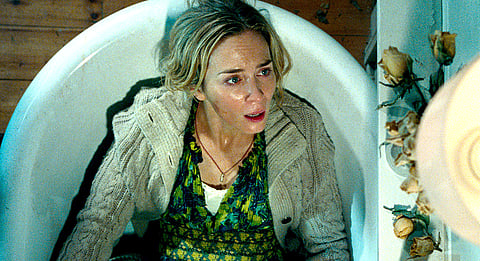
- Reviews
- Power List 2024
- Cannes 2024
- In-Depth Stories
- Web Stories
- News
- FC Lists
- Interviews
- Features
- FC SpecialsFC Specials

Director: John Krasinski
Cast: Emily Blunt, John Krasinski, Noah Jupe, Millicent Simmonds
The cinema hall was a quiet place. You could hear a pin drop. Only, the person who drops that pin would be dead within seconds. The owner of a ringing cellphone would perish, too – and rightly so. A sneeze might be fatal. The sound-sensitive creatures would virtually be treated to a human buffet at the traffic signal replete with honking cars and frustrated commuters outside the multiplex. Pressure cookers, barking dogs, airplanes, train stations, football stadiums, amorous couples, annoying cricket commentators – mass massacres. Mumbai, a factory belt of
overlapping noises, never stood a chance. This nation thrives on the musical clamor of disruption.
These are just some of the images that – very, very silently – tiptoe through our minds as we watch Lee (John Krasinski), a survivalist and American family man, forlornly reach "India" on the country list after failing to elicit a single response to his Morse code messages. The mere sight of India makes him quit for the day.
Almost every scene is a throbbing set piece, because the premise pivots on the very core of human nature
Living in an isolated, customized farmhouse reminiscent of the one in M. Night Shyamalan's Signs, Lee, his wife Evelyn (Krasinski's real-life spouse, Emily Blunt) and son Marcus (Noah Jupe) communicate in the language of their deaf daughter, Regan (Millicent Simmonds): signs. Regan's defective cochlear implant is one of Lee's many ongoing projects. They are still grieving the loss of their youngest; he died in an exquisitely designed opening scene that we keep mentally revisiting to imagine – we don't see the immediate aftermath – the unprecedented
courage of a family that must have had to instantly mute their reaction to abrupt bereavement. They weren't afforded the slightest of sobs.
Months later, when the camera focuses on Evelyn's pregnant tummy, we find ourselves sinking into a whole new line of dystopian paranoia: did we really need a bigger reason to fear the wrath of crying babies? Have they taken it upon themselves to repopulate the planet? Will inbreeding be allowed? Worst of all – and you'd think this would be the grandstanding climax of a lesser film – how on God's silent earth will that process of childbirth be?
The film does that. Almost every scene is a throbbing set piece, because the premise pivots on the very core of human nature. Almost every emotion has to be recalibrated to fit the realms of a gagged talkie. Every action, even something as basic as stepping on a rusty nail, clutters our headspace with consequences and allegories moments before it occurs.
On a figurative level, this film has every right to exist. There has arguably never been a noisier era in the history of civilization. From a disgruntled, sleep-deprived alien's point of view, Earth must look like the vibrating shiny disco ball of the galaxy; you can't fault them for sending an army of giant sharp-toothed earholes to shut down our nuisance. There's also the political aspect – no matter how far you run, you can't escape the product of your own misgivings. There is the social aspect – parenthood is all about fighting (tooth and nail) to equip your children
with a voice. There's the cinematic aspect – a bathtub full of blood can symbolize death as well as birth, while the very concept of unnecessary jump scares can be pre-empted by the diagonally opposite concept of accidental sounds.
If this film were a character occupying its own environment, it would be the only one to survive in a rowdy university library adorned with a loud "Silence Please" warning
Similar dystopian movie landscapes that thrive on elemental fear – Shyamalan's The Happening and Marc Foster's World War Z place us bang in the middle of apocalypse, and Francis Lawrence's I Am Legend begins with post-apocalyptic New York – also equip their protagonists with a sensation of early loss to trigger a journey of defiant strength. In each of them arrogant human folly, whether it breeds rogue viruses or vengeful plants, is the cause of total wipeout. But A Quiet Place, not unlike the path breaking Get Out, is so current, uncomplicated and all encompassing with its narrative templates that it's impossible not to laud its slick form of genre activism. A few newspaper clippings aside, there is justifiably no effort to convolute the suspended logic. Knowing more is
hearing less.
The picture is surprisingly big on heart, not least due to its opportunistic tendency to highlight beats with an organic background score. Ironically, by mirroring the essence of its own world-building rules, a film like this
employs the craft of horror as a tool of communication – as a medium of signs – to suggest a broader battle at large. If this film were a character occupying its own environment, it would be the only one to survive in a rowdy university library adorned with a loud "Silence Please" warning. It might take a few minutes, then, for the inevitable to dawn upon us – these famished, blind monsters that attack sounds would love the modern-day horror movie. They would feast on the sensory excesses of contemporary storytelling. In this context, a lyrically appropriate testament to Krasinski's interactive atmosphere lies in the fact that perhaps the safest space to hide in would be a deathly silent late-night screening of A Quiet Place. Unless, of course, you're in India, in which case the National Anthem kills you first.